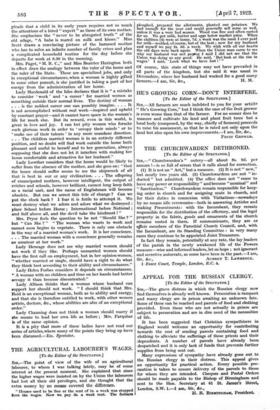THE AGRICULTURAL LABOURER'S WAGES.
[To the Editor of the SPECTATOR.]
Szn,—The point of view of the wife of an agricultural labourer, to whom I was talking lately, may be of some interest at the present moment. She explained that since the higher wages were insisted on by the Union the labourers had lost all their old privileges, and she thought that the extra money by no means covered the difference.
" Houses used to be free or the rent of Is. a week was stopped (rem the wages. Now we pay 38. a week rent. The farmers ploughed, prepared the allotments, planted our potatoes. We had enoug% for the year and could generally sell some as well, unless it was a very bad season. Wood was free and often carted for us. We got milk, butter and eggs below market price. When the children (4) were at home, 7d. a week was the most I ever paid for milk—scalded, of course, but of the best ; now for my husband and myself we pay 2s. 3d. a week. We wish with all our hearts the old days were back again. When the Union man came to see why my husband was not paying I said I did not see that the Union was doing us any good. He said, 'But look at the rise in wages.' I said, 'Look what we have lost ! ' "
Of course, this state of things may not have prevailed in all parts of the kingdom, but she said it was usual_ in Devonshire, where her husband had worked for a good many










































 Previous page
Previous page